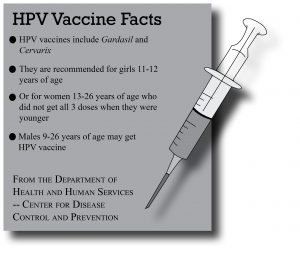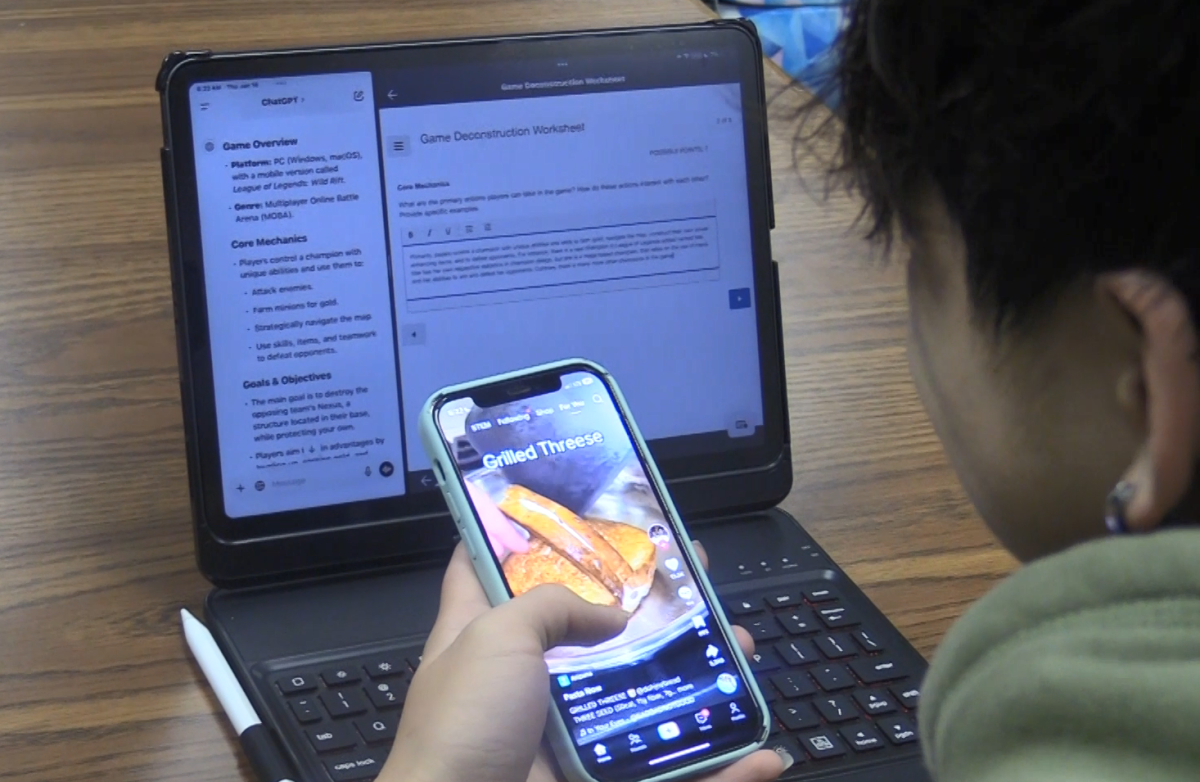 The Centers for Disease Control is expected to recommend both boys and girls be vaccinated for a virus that can cause cancer, but the new recommendation is causing some controversy.
The Centers for Disease Control is expected to recommend both boys and girls be vaccinated for a virus that can cause cancer, but the new recommendation is causing some controversy.
Last month, the Food and Drug Administration approved the use of the HPV vaccine for boys, and the CDC announced that it will probably recommend that boys age ll and older get the vaccine to prevent Human Papillomavirus. HPV has been connected to cervical cancer in women, and genital warts and cancer in the back, neck and anal area for both genders. HPV is sexually transmitted and is believed to be the main cause of cervical cancer
“You absolutely have no symptoms for HPV. The only way you know is when you go in for yearly checkup,” Nurse Carol Wiley said. Due to that, abnormal cells could start to form without any warning, after a single exposure. Nurse Wiley believes the decision to vaccinate should be left with parents. “I’m not going to say whether it should be mandatory or not,” she said, “because that is the parent’s choice.”
There are two vaccines for HPV: Cervarix and Gardasil. Both are given in three doses. The vaccine has been recommended only for female patients in past five years. However, since 2006, health officials have had little success in encouraging girls to get the vaccine due to various reasons. Now many wonder how much success will come when the vaccine is recommended for males.
Business teacher Doris Curry said she is in favor of the vaccine for both boys and girls.
“Anytime you can prevent cancer, it’s a good thing,” she said. “[Boys] are as sexually active as girls, so why not? I’m for the vaccine because you guys tend to talk to each other and not to your parents to help you do something about the problem, so you’re more likely to have HPV.”
Sophomore Sarah R. agreed with Curry.
“I think it’s worth it but, I wouldn’t get the vaccine because I’m not sexually active,” she said. Some parents think that having their children get the HPV vaccine will promote promiscuous behavior, and some doesn’t want to think about their children having sex. “I know my mom would not let me get it either, because she knows I’m not sexually active.”
Freshman Kaithlynn N. disagrees.
“I think all the girls should get it even though it’s very expensive. More than half the percentage of men and more than three-fourths of women had HPV throughout the course of their lifetime,” Kaithlynn said “Even though you’re not planning to do it yet, it’s still good to have it just in case.”
Junior Flaviu D. said he was concerned about negative side effects from the vaccine.
“Sometimes vaccines cause more damage than the virus itself,” Flaviu said.
Studies show that between 2006 and 2009, 47 deaths were linked to Gardasil. The side effects include high fever, weakness or paralysis, rash, difficulty breathing, and possible allergic reactions. Some sources recommend that for at least 15 minutes, the patient is watched after the vaccination just in case there are any side effects.
Dr. Winetta Bilings, mother of a Kerr student, questions whether the side effects are worth the protection provided by the vaccine.
“The quandary for me is whether it is worth risking vaccine side effects when the odds are that the recipient will not be exposed to the illnesses the vaccine is designed to prevent,” saidBillings.
But she supports recommendations that both boths and girls get the vaccine.
“If [the government] can vaccinate both males and females, and even if the rates of vaccination are low in both populations,” she said, “they will have the opportunity to prevent disease in a larger number of people than they would be treating just females.”
Physical education teacher Mary Pat Bailey is skeptical that the vaccine would be effective.
“There are so many strains to HPV and to think that the vaccine will take care of one, is the most ridiculous thing in the whole world,” she said. She believes the CDC recommendation is due to pressure put on the government by the pharmaceutical industry.
Controversy about the vaccine erupted in 2007, when Governor Rick Perry passed an executive order requiring the vaccine for all seventh grade girls in public schools. Critics said donations from pharmaceutical company Merck influenced Perry’s order. After protests and lawsuits, the order was overturned in May 2007 by a bill passed by the Texas Legislature.
But Perry is still being criticized for the move, with fellow Republican presidential hopeful Michelle Bachman asking in a recent debate, “Is it about life, or was it about millions of dollars and potentially billions for a drug company?”
Perry has responded that the amount donated by Merck to his campaign — $5,000 — was not enough to buy his influence.
Despite the possible risks and the controversy, senior Helen T. has already received all three shots.
“I support it,” Helen said. She says she and her mother support anything that prevents cancer or other dangerous illnesses. “Girls should definitely get [vaccinated].”
Many of the students interviewed for this article were unaware of the vaccine and the CDC recommendation. For now, the government only suggests that pre-teens get the vaccine; it is not required at either the state or federal level.






